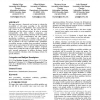Free Online Productivity Tools
i2Speak
i2Symbol
i2OCR
iTex2Img
iWeb2Print
iWeb2Shot
i2Type
iPdf2Split
iPdf2Merge
i2Bopomofo
i2Arabic
i2Style
i2Image
i2PDF
iLatex2Rtf
Sci2ools
HT
2007
ACM
2007
ACM
User-tailored web accessibility evaluations
This paper presents a framework and system to evaluate the accessibility of web pages according to the individual requirements of users with disabilities. These requirements not only consist of users' abilities, but also users' assistive technologies and the delivery context. In order to ascertain interoperability with other software components, user requirements are specified taking advantage of the extensibility of the W3C CC/PP recommendation and other featurespecification vocabularies. An evaluation tool capable of understanding these specifications generates evaluation reports that are tailored to the user's individual needs. Quantitative accessibility measures resulting from personalized evaluation reports can be used to improve the web browsing experience for users with disabilities, such as through adaptive navigation support and by sorting the results of search engines according to users' personal requirements. In addition, developers benefit from personal...
Related Content
| Added | 16 Aug 2010 |
| Updated | 16 Aug 2010 |
| Type | Conference |
| Year | 2007 |
| Where | HT |
| Authors | Markel Vigo, Alfred Kobsa, Myriam Arrue, Julio Abascal |
Comments (0)

